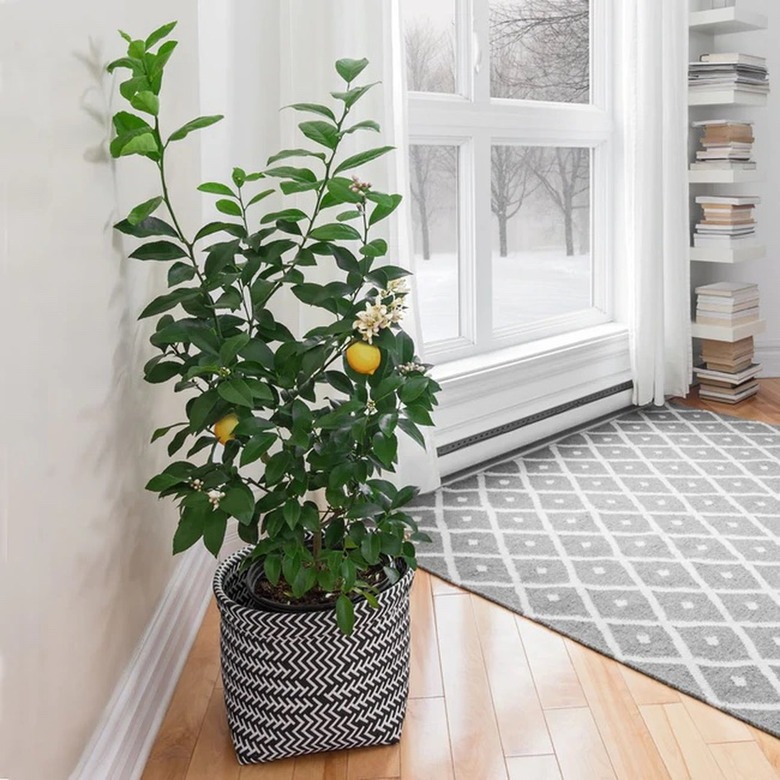How To Start Lemon Seeds Indoors
We may receive a commission on purchases made from links.
Most of the lemons you buy are grown in gorgeous citrus orchards in balmy climates, but you may not realize how easy it can be to start lemon seeds indoors and grow a lemon tree (Citrus x limon, USDA zones 9-11) at home. It might take some time for the lemon seeds you grow indoors to produce fruit, typically six to seven years. And it's also important to know that a seed-grown lemon tree won't be identical to the plant (or produce the same type of lemons) that grew the fruit from which you extracted the seed, particularly since commercial lemon trees are grafted plants. In the meantime, growing fruit indoors can be a cheery addition to any home.
1. Create the Right Growing Conditions
1. Create the Right Growing Conditions
Before planting a lemon tree, ensure you have the right growing conditions. Typically, lemon orchards are found in places like India, Southern California, Florida and Italy. Other varieties of lemon trees like the popular Meyer lemon tree are native to China. In those climates, temperatures are relatively warm throughout the year, and there's plenty of sunshine to help the growing lemon tree stay vibrant.
If you already live in a sunny climate where temperatures don't regularly dip below about 55 degrees Fahrenheit, you have a great location for a lemon tree. Find an area in your home that receives at least four hours of direct sunlight and where temperatures remain between 60 and 70 degrees F as consistently as possible. For instance, don't place it directly under an air conditioning unit since that could significantly cool its space. Many people find that the warmth on the top of a refrigerator or a sunny, south-facing windowsill that is well insulated are two great spots for their lemon plants.
If you live in a cooler and grayer climate, you can still grow a lemon plant indoors. You'll just need a few more resources. Many indoor gardeners use artificial light to mimic sunlight. Depending on the size of your plant and the setup in your home, you could look into hanging LED lights, grow lights designed for citrus plants or 40-watt fluorescent tubes to get enough light to start lemon seeds indoors success.
2. Choose Your Lemon Seeds
2. Choose Your Lemon Seeds
Once you've secured a proper location, you can start lemon seeds indoors. There are a few options for starter plants. You can start with seeds from a lemon. You'll likely want to choose an organic lemon, since sometimes nonorganic lemons have modified seeds that will not germinate. If you're going that route, sow the seeds as soon as you can so they don't have time to dry out.
In order to produce fruit sooner, you can also get a head start with a starter plant from your local nursery. Often, these are small lemon trees that have been grafted from parent trees.
3. Put Your Lemon Seeds In a Pot
3. Put Your Lemon Seeds In a Pot
Once you have your starter, find an appropriate pot for your lemon tree. If you're starting with a seed, make sure your pot is at least 6 inches wide and 6 inches deep to give your lemon seedling ample room to grow. If you're using a grafted tree, make sure you have a pot 6 inches wider and deeper from the very tip of the roots.
Put your seeds or starter into a pot with a drainage hole that's filled with high-quality and lightweight potting mix to help with drainage. Look for potting mixes with ingredients including perlite, peat moss, pine shavings and vermiculite. Even better, purchase potting mix specifically blended for citrus plants.
4. Care for Your Lemon Tree
4. Care for Your Lemon Tree
Water your lemon tree immediately, making sure the soil is moist but not soggy. Your watering schedule will vary depending on the size of your plant and how much light it receives. In general, provide your plant with enough water so that the soil stays on the drier side but is never completely dry.
Some new citrus growers are surprised to learn that the plants usually need more than water and sunlight. They also want fertilizer. Top-dress the soil around your lemon plant with worm castings, and use a plant fertilizer formulated for citrus plants.
5. Wait for the Fruit
5. Wait for the Fruit
Once you've sown your lemon seeds, it's time to wait. If you started with seeds from a lemon, you may have to wait for five or more years before the plant develops fruit, although you should start to see some interesting lemon-like produce before that. If you used a starter plant, you may start to see lemons in as soon as two years. It may seem like a long time, but it will make your homegrown lemons taste that much better in the end.
